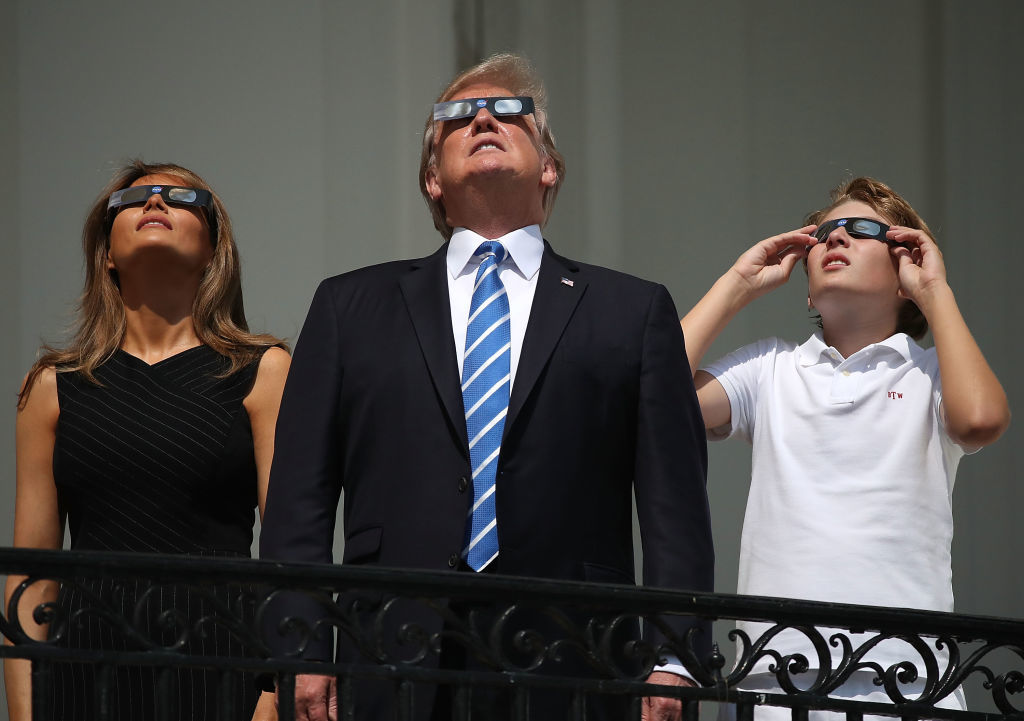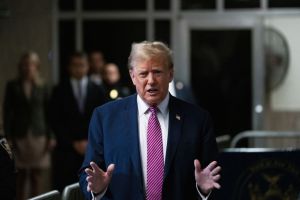Americans traumatised by their current president could be forgiven for thinking that his demand for a ‘space force’ was about protecting the country from aliens. Aliens, that is, of extraterrestrial persuasion, not the ones currently hurling themselves against the southern border. What, really, is implausible these days? As baseball savant Yogi Berra said when told that a Jewish woman had been elected mayor of Dublin: ‘Only in America.’
But as it turned out, Donald Trump’s demand to have a new sixth branch of the US armed services is about protecting America’s satellites and cyber capabilities. A worthy goal.
Per the President’s custom, he didn’t inform the White House that he was going to issue his decree. The citizenry may be traumatised, but what must life be like for his poor chief of staff, General John Kelly? Does his inbox have a sign on it saying, ‘What Fresh Hell Is This?’ And what must have been going through the mind of the chairman of the joint chiefs of staff when Trump pulled this rabbit out of his hat on 18 June at a public event?
‘We are going to have the air force,’ the President said. ‘And we are going to have the space force. It is going to be something so important.’ Whereupon he turned to the chairman and said, ‘General Dunford, if you would carry out that assignment, I would be very greatly honoured, also.’
Also? General Joseph Dunford, a Marine, loyally replied: ‘We got it.’ What else could he say? But oh to have been inside his head at that moment. The Pentagon press secretary emailed reporters after the event: ‘Working with Congress, this will be a deliberate process with a great deal of input from multiple stakeholders.’ This is Washington mush of the highest order. Translation: ‘We’ll have something for you sometime before the next Ice Age.’ The air force, the most recently minted branch of the armed forces (1947, Truman administration), and the one most potentially affected by the President’s ukase, pledged to undertake a ‘thorough, deliberative and inclusive process’. Translation: ‘We’ll get back to you some time before the next millennium.’
The Wall Street Journal, generally favourable to Mr Trump, reported that his announcement resulted from a fit of pique. He had asked the Pentagon to create a space force months ago. When they didn’t, he went — as is his wont — rogue, and simply announced it as a fait accompli.
The Journal noted: ‘If Mr Trump feels appointees are dragging their feet, he may suddenly demand action, sometimes in a dramatic and public fashion.’
As the President said admiringly of his new best friend, Kim Jong-un: ‘He speaks and his people sit up at attention. I want my people to do the same.’ Quite.
Some months ago, to an audience of Marines — who always sit up at attention — Mr Trump revealed that his inspiration came from that most reliable of quarters: himself. ‘You know,’ he told them, ‘I was saying it the other day — because we’re doing a tremendous amount of work in space — I said, “Maybe we need a new force, we’ll call it the space force.” And I was not really serious, and then I said, “What a great idea. Maybe we’ll have to do that. That could happen.” ’
Parse that if you dare. Meanwhile, will it happen? For starters, creating a new branch of the armed services requires an act of legislation in the form of a Senate vote. The President cannot simply make it happen by diktat. The Senate is currently Republican and invertebrate; but that could change after the November elections. And as the Pentagon spokesman has signalled, the ‘deliberate process’ is going to take time with all that ‘input from multiple stakeholders’. Set your phasers on yawn.
Chief among those stakeholders is the air force, which is already doing what a space force would do. It hates the idea. A year ago, the secretary of the air force, Heather Wilson, was declaiming loudly against it: ‘The Pentagon is complicated enough.’ She added, with sub-zero sangfroid: ‘If I had more money, I would put it into lethality, not bureaucracy.’ By all means, let us have more lethality!
The army and navy, similarly already engaged in cyber and space defence, are also against it. For whatever it’s worth (unclear), Trump’s own Secretary of Defense, James Mattis, also thinks the idea is a clunker.
So the argument against is twofold: 1) Trump wants it, therefore it must be a bad idea, and 2) the military establishment doesn’t want it, because they’re already doing it. But — deep breath — one ought to guard against Trump Derangement Syndrome. Just because Trump is for something doesn’t necessarily mean it is, eo ipso, a bad idea; and bureaucracies always resist what they view as turf encroachment.
12 January 2007 may some day take its place in the annals of Holy Shit Moments alongside 4 October 1957. On that latter day, the Soviets launched Sputnik, which soon had Lyndon Johnson declaring that Americans would not abide going to bed at night by the light of a communist moon.
On the prior date, China launched a ballistic missile equipped with a second-stage ‘kinetic kill vehicle’. It climbed to an altitude of 537 miles and atomised a malfunctioning Chinese weather satellite. The explosion added more than 3,000 pieces of space debris to the existing half-million pieces of debris, each larger than a marble, orbiting the earth. It’s getting pretty cluttered up there, as George Clooney found out in the opening scene of Gravity.
That elegant bit of Chinese fireworks was a chilling, teachable moment. If they can shoot down their satellites, they can shoot down ours.
A year later, the US navy sent a message: Beijing, you (too) have a problem. In a nifty bit of marksmanship, it fired an SM-3 missile at a wobbly US satellite 133 miles up, going 17,000 miles per hour. The American arsenal has ‘hundreds’ of SM-3s. Our powder is dry.
Russia, meanwhile, has not been idle, shooting down not only Malaysian Airlines but also successfully completing five anti-satellite missile tests.
Is all this an argument for making the ether bristle with weaponry? Recall the ‘missile gap’. JFK coined the term in 1958, when — strange as it still sounds — he attacked President Dwight Eisenhower for being soft on defence. As it turned out, the ‘gap’ was entirely to America’s advantage. We had
57 working ICBMs; the Russkies had … ten. When president-elect John F. Kennedy was briefed on the actual facts by Eisenhower’s science adviser, he ‘greeted the news with a single expletive, delivered more in anger than in relief.’ A year later he was dealing with Russian missiles in Cuba, doubtlessly again muttering expletives.
Would the Chinese, or the Russians, dare to attack one of our satellites, knowing that it would invite retaliation? The principle of deterrence has been validated by more than 70 years of keeping the major powers from annihilating each other.
In 2000, a Chinese military thinker named Wang Chen published an article: ‘The US Military’s “Soft Ribs”, a Strategic Weakness’. He wrote, ‘For countries that can never win a war with the United States by using the method of tanks and planes, attacking the US space system may be an irresistible and most tempting choice.’ ‘Soft ribs’ and ‘an irresistible and most tempting choice’ sound like a new definition of Chinese takeout. Consider, too: Mr Trump made his surprise announcement in the midst of his detainee crisis, as TV screens filled with wrenching images of children separated from their asylum-seeking parents at the border. Was this out of the JFK playbook?
The Bay of Pigs fiasco took place between 17 and 19 April 1961, months into Kennedy’s term. Kennedy manfully took ownership of the disaster, then pivoted a few weeks later by announcing that America would put a man on the moon by the end of the century. We’re going to the moon! Suddenly no one was thinking about the Bay of Pigs, except for the poor sods abandoned in the mangroves. Is Trump, like Kennedy, trying to redirect our eyes away from his pig’s breakfast on earth to that most excellent canopy, the air?
Seizing the high ground has been a fundamental military tactic since men first started throwing rocks at each other. In his Art of War, Sun Tzu (an author surely familiar to Thinker Wang Chen) advises taking the high ground and letting the enemy attack from below. Today’s high ground is all those shiny satellites. Knock them out and we plunge, instantaneously and with great whingeing, into a new Dark Age. Everything comes to a stop. It won’t even be with a bang. As P.W. Singer, author of Cybersecurity and Cyberwar has noted, ‘The first shots in a war between the US and China or Russia, no one would likely hear.’
Assuming Mr Trump’s call to establish a space force is the result of dispassionate analysis, broad discussion, careful deliberation, thoughtful analysis and… er… uh… Well, let’s ask two people with deep knowledge of the field. Retired Admiral James Stavridis is the former Supreme Allied Commander for Europe. He’s now head of the Fletcher School of Law and Diplomacy at Tufts. He tells me he’s all for it.
‘Long overdue. The next logical step is a cyber force, which could be combined with the new space force. Much as the army and navy fought tooth and nail against the idea of the air force in the pre-World War II era, the existing services will fight against both a space and cyber force. But it’s the right thing to do.’
Ken Adelman was head of the Arms Control and Disarmament Agency under Ronald Reagan. He was there in Reykjavik when Reagan refused to give up his Strategic Defense Initiative (missile defence, essentially). He now teaches Shakespeare.
‘I’m not big on government organisation,’ he says, ‘since everyone then focuses on what desks are moved, parking spots, org charts, etc. If the administration were competent, which no one even suspects any more, it would tighten security of satellites by presidential or Sec Def [Secretary of Defense] edict rather than the chaos of a re-org. But this administration always prefers chaos to safety.’
There is another possibility. That it’s just an excuse to throw himself another parade. Even bigger than Macron’s! More like the ones in Pyongyang. Rockets on trucks. So big.


















